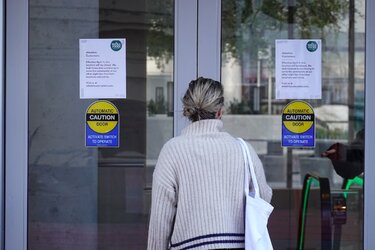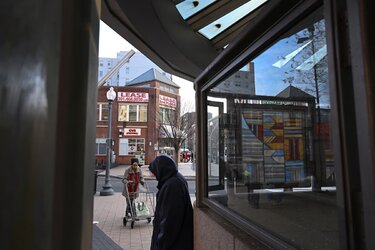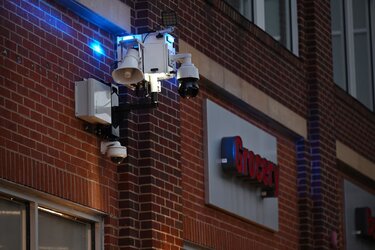How one Washington, D.C., drugstore got spun by the culture wars into a symbol for America’s shoplifting panic
By Maura JudkisMarch 1, 2024 at 5:00 a.m. EST

The infamous CVS in Columbia Heights that closed at the end of February. (Matt McClain/The Washington Post)
There is almost nothing left to steal at the CVS in Columbia Heights, and that gives you an idea of which items have actual value.
Blank CDs, for example — the thieves don’t even bother with them. The greeting card section has been left alone. The good magazines like Vogue and GQ and Sports Illustrated are gone, but there are still a few copies of Traditional Home, some special issues of Life devoted to Willie Nelson, and a Woman’s World that declares: “Bye bye, jiggly fat!” No soft drinks, but three gallon-sized jugs of Arizona green tea are still on the shelves on one recent visit.
Everything else that remains in the store in Northwest D.C., which is not much, is under plexiglass: Dawn dish soap, L’Oreal shampoo, MiraLax, a handful of Clairol root touch-up hair dye kits, flu season combo packs of DayQuil and NyQuil. The diapers are behind the counter. The Cetaphil and Neutrogena face washes are under lock and key.
Other shelves, stretching entire aisles, are totally empty.
It has been like this since at least October, when the Legend of the Empty CVS of Washington began to spread beyond the District’s borders. It became a horror story of Late Capitalism. Tales were told on social media, and in the comments sections of local news stories, and they were full of spooky scenes (harsh fluorescent lights shining on bare shelves!) and jump scares (hordes of teenagers reportedly ransacking the stores!).
But the thing about scary stories is that they metastasize with each retelling. So by the time it got to the New York Post, and then the conservative British tabloids, and then Twitter accounts with names including “No. 1 Deplorable,” the empty CVS had somehow become a stand-in for all that is wrong with American cities — and liberals (and liberal democracy?) — in 2024.
In the meantime, the zombie CVS kept filling prescriptions, dead but somehow still shuffling along — until Thursday, when corporate shut it down, at last.

Empty shelves in the Columbia Heights CVS, as seen in January. (Michael Reynolds/EPA-EFE/Shutterstock)
On NextDoor, the social media site where neighbors go to ask whether fireworks are gunshots, the state of the CVS had become a consistent topic. One that usually devolved into people calling each other “thugs” or “Karens.”
“This unchecked lawlessness at any age needs to be stopped or the criminals will be governing us,” wrote one neighbor.
“Stop with the dog whistle nonsense,” wrote another.
“Its beginning to feel like the Columbia Frights of 20 years ago,” wrote yet another.
America is a sticky-fingered nation built on stolen land, and its current moral panic is about shoplifting. It’s not just a worry in Columbia Heights. All over the country, from sea to shining CVS, there are concerns about petty theft, which some retailers claim is worse than ever before. Videos of brazen thefts have gone viral. It has become a political talking point, and a political liability.
But the data is murky. Theft has gotten worse in some cities but better in others; it’s either underreported or overexaggerated, depending on whether you’re asking a corporation or a bureaucracy. Anecdotes and vibes have filled in the gaps. It doesn’t help that 2024 in America feels a bit like visiting a dying mall. Will some new stores open and bring everyone back, or will it be razed to create a parking lot?
The reasons this particular CVS’s shelves have been empty are complex, but Carlo Perri — co-chairman of Advisory Neighborhood Commission 1A’s Committee on Public Safety — is trying to break them down as simply as possible.
First, there are the economic factors triggering human need: joblessness, inflation, a slow recovery from the pandemic. There have also been changes to how police officers do their jobs — “a dearth in active policing,” as Perri puts it, that started in the pandemic, combined with efforts to use alternative forms of crime deterrent. “But none of those alternatives really were implemented effectively, or as effectively as they could have been.”
That dovetailed with CVS policy. Like many retailers, the drugstore chain employs security guards but instructs them not to pursue shoplifters. Meanwhile, in Washington, city officials say they’ve observed a rise in organized retail crime, which involves thefts of items to be resold on the street.
“If shoplifting is easy and available to you, with low accountability, then, you know, it just is a practical choice,” Perri says.
He and co-chairman Billy Easley personally met with corporate representatives from CVS to propose solutions, they say. The store was kept open while the company pondered its options, but left unstocked to prevent further losses, the co-chairs had been told.

“It's embarrassing for people to walk into a neighborhood CVS or any store and for it to be barren,” said a local ANC representative. (Matt McClain/The Washington Post)
“It’s embarrassing for people to walk into a neighborhood CVS or any store and for it to be barren. And there are many families that depended on that store,” Easley says. “Low-income families.”
Perri says they did “everything within our powers, as prescribed by the D.C. City Charter, to ensure that these businesses remained.” But those powers are limited: In January, CVS announced it would close the store on Feb. 29.
In a statement, CVS spokeswoman Amy Thibault called it a “difficult decision” and noted that all prescriptions would be transferred to other nearby CVS locations.
But while she cited factors such as “local market dynamics” and “population shifts” to explain the closure, she made no reference to the widely reported incidents of shoplifting and declined to answer specific questions about the Columbia Heights store.
Ward 1 Councilmember Brianne K. Nadeau — who is facing a recall campaign led by a Columbia Heights business executive who feels Nadeau has not done enough to address crime — declined to comment. Mayor Muriel E. Bowser took a question about the imminent closure of the empty CVS during an unrelated Jan. 25 news conference about a new blood transfusion program.
“We have to stop treating it … like kids just shoplifting a thing or two, because it’s having real impact on the ability for people to get the goods and services that they need,” said Bowser. “So the law has to be right. The police have to be able to do their jobs. And the prosecutors have to do their jobs. We do have to send the message in our city that stealing anything, anywhere, has consequences.”

On the other side of the country, a customer reads a sign posted at a closed Whole Foods store in San Francisco. (Justin Sullivan/Getty Images)
Before the Washington CVS got caught up in the culture wars, it was the San Francisco Whole Foods.
The high-end grocery chain struggled with theft at its primary downtown outpost — as well as the drug use and violence that had frustrated the neighborhood well before the store opened. When these factors led to the store’s closing in April 2023, partisan critics on Fox News greeted the news with glee. If a Whole Foods couldn’t make it in San Francisco — the land of $14 kombucha and artisanal farro — then things must be really “spiraling out of control,” said Geraldo Rivera on Fox’s “The Five.”
“This city is disgusting,” declared co-host Jesse Watters. And “now, they can’t have organic rhubarb.”
In certain conservative circles, there’s a wild narrative about cities as terrifying hellholes of crime, theft and lawlessness. The bleakness of the D.C. CVS played right into this belief.
“The shelves are literally empty at CVS in DC thanks to shoplifters,” posted one account called End Wokeness on X. “Don’t care. They voted for this.”
“Democrat’s [sic] soft-on-crime policies have made our American cities uninhabitable!” wrote the Center for Renewing America, a conservative think tank, on X. Research has not found a correlation between political party leadership and a city’s crime rate.
“You can make it a left-wing, right-wing argument all day long. But at the end of the day, it’s a community issue,” says Karl Langhorst, a retail theft prevention expert who teaches at the University of Cincinnati’s School of Criminal Justice. “Organized retail crime has been around for many years and gone through many different political parties in power.”
While it’s true that the Columbia Heights CVS, as well as parts of the surrounding neighborhood, are experiencing crime and theft, it’s hardly the dystopian nightmare that outsiders make it out to be. It’s not even a retail desert: A Lidl grocery and a Burlington clothes store recently opened in the shopping complex cater-cornered from the CVS. An Indian restaurant is about to make its debut up the street.
Also: There is another CVS pharmacy inside the Target literally one block away from this one.
But, yes, there are certain visuals that encourage a sense of dystopia or paranoia. That same Target has closed one of its entrances, and it has posted a sign at the other stating that unaccompanied minors are prohibited.

Signs indicating that the building hosting the Columbia Heights CVS will be available for lease. (Matt McClain/The Washington Post)
If we try to judge by the social-media algorithms that feed off our fears and lusts, shoplifting seems worse. But is it?
The data doesn’t tell a clear picture, Langhorst says, because crimes are not always reported to authorities.
“In many cases, law enforcement doesn’t respond because they don’t have the resources to do so,” Langhorst says. Some jurisdictions don’t make it easy for retailers to file reports online, too. “So now the perception becomes, from a retailer’s perspective, ‘Why waste my time reporting if nothing is going to get done about it?’”
But industry groups have also overexaggerated the problem. In December, the National Retail Federation “retracted a claim that ‘organized retail crime’ accounted for nearly half of all inventory losses in 2021 after finding that incorrect data was used for its analysis,” Reuters reported.
When industry professionals talk about “shrink” — retail jargon for financial losses due to thefts — they talk about the “increased violence and just brazenness” that they’ve observed among shoplifters lately, Langhorst says. Is it especially bad in D.C.?
“D.C. is one of the cities that is high on the radar of opportunities and challenges,” Langhorst says, which is a polite way of saying, yes, it is.

Police surveillance equipment outside the Columbia Heights CVS. (Matt McClain/The Washington Post)
In January, Fox 5 reported on a set of fliers that had been posted in Columbia Heights with the rallying cry “Shoplifters Unite,” encouraging people to “Take everything that’s not nailed down. Bust windows.” The poster also makes allegations of racism against a Safeway manager and contains a jumble of left-wing talking points referencing Palestine, reparations, the Black Lives Matter movement, and disability rights. It seemed, quite frankly, very fake, designed to exacerbate neighborhood tensions. The Fox reporters took it seriously, interviewing people in front of the zombie CVS.
Last month, that particular Safeway — which sits half a mile from the CVS, in Lanier Heights — installed new security gates that require customers using the self-checkout to scan their receipts before they leave. Days later, the store was robbed, according to WTOP. A week later, federal prosecutors charged a manager of a D.C. Walgreens with conspiracy, for orchestrating a series of violent robberies on his own store.
Maybe there’s just some ennui about nihilistic lawlessness in 2024. If a former president can commit financial crimes — and still run for office and probably win his party’s nomination — well, what’s a little petty shampoo theft, in the grand scheme of things?
Besides, there’s a Robin Hood mentality that has long bedeviled the folks like Langhorst who are charged with preventing retail theft. Thieves assume that a massive corporation can absorb the losses of petty thefts. Some shoplifters view it as a form of anti-capitalist social activism.
But as activism, it’s rather ineffective — more likely to harm a store’s lower-paid workers than the chain’s chief executive Karen Lynch, who was paid $21.3 million in 2022, according to CVS regulatory filings.
“When you’re stealing from that store, you are in fact stealing from those employees, in a sense, because it does impact their livelihood,” Langhorst says.
Though the CVS spokeswoman’s statement said that all of the store’s employees were being offered jobs at other locations, a Columbia Heights employee who spoke on the condition of anonymity because he was not authorized to speak for the company said he was still unsure whether he would be offered work at another CVS once this one closed.

The Columbia Heights CVS at twilight last week. (Matt McClain/The Washington Post)
Back to the brains of this zombie operation: the employees.
In the dwindling, final days of this CVS, there are still a few prescriptions awaiting pickup. Outside, an automated recording can be heard in a robotic voice: “This is a security operations center. This property is being monitored.”
It might seem a bit unnerving to work in an empty CVS, but a lone employee running the register points out that there’s still plenty to do. There are passport photos to take. He had to open the case whenever anyone wanted to buy the few remaining hair products behind plexiglass. The diapers and baby formula are all behind the counter, which is his domain.
A man enters the store and holds up a picture of Charms Blow Pop lollipops on his phone, asking if they had any.
“No candy,” says the clerk. (No candy at a CVS? Maybe we are in the end times.)
The customer looks around at the shelves, barren of American plenty. “It’s all like this?” he asks.
Certainly feels that way, sometimes.
Source (Archive)

